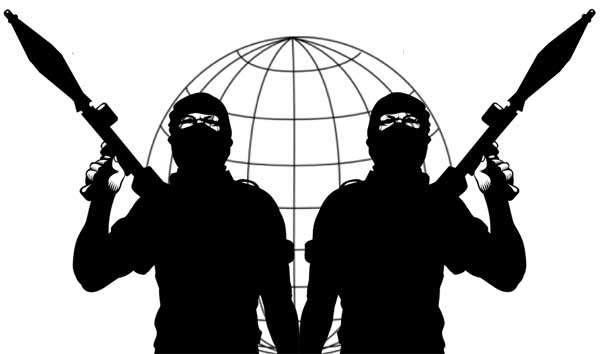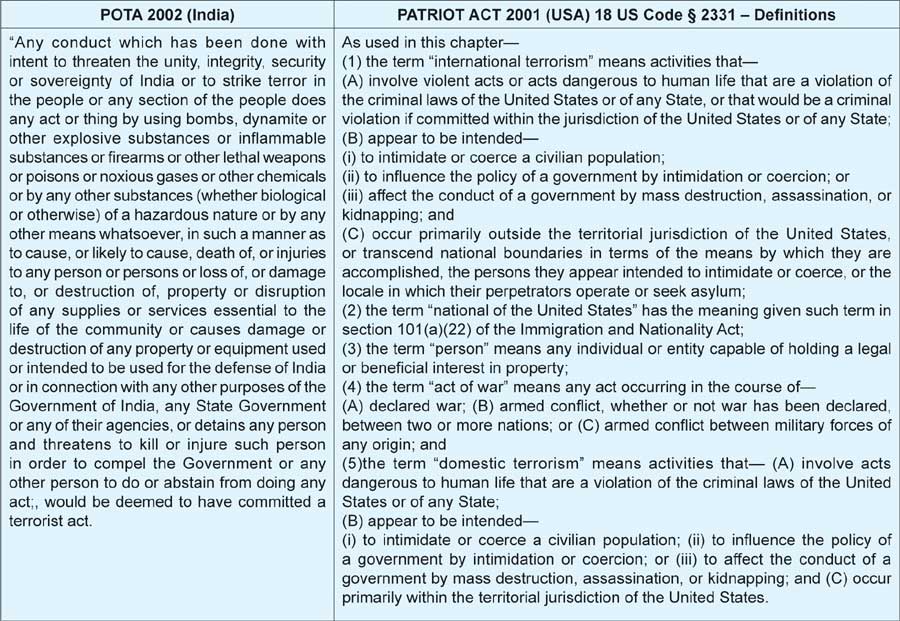The states which are nurturing and nursing terrorists must be held responsible for the conduct of non-state actors because they operate from within the territorial boundaries of the host country. Every state is bound to respect the sovereignty of other countries, and hence these states cannot avoid its liability by any excuses. India’s vital interests can be better served by invoking the expanded doctrine of offensive self-defence, which has witnessed a normative evolution, particularly in relation to non-state actors, following the events of September 11, 2001. This expanded doctrine, has also gained acceptance of the Western powers and scholars which permit the victim states to use force against non-state actors and breach the territorial sovereignty of foreign states in response to an accumulation of terrorist attacks.
Every nation evolves its identity by the religion professed by the majority of its populace…
For the past two years, the New Year celebrations in India were marred by brazen attempts of terror from our hostile neighbour. On the preceding night of January 01, 2015, the Indian Coast Guard neutralised a boat whose occupants were carrying lethal explosives but in a shameful stand taken by the Congress party, a total benefit of doubt was given to Pakistan.
On January 02, 2016, a group of terrorists entered the Indian Air Force base at Pathankot with the aim of destroying the strategic war assets in a sneak attack that was averted with advance intelligence intercepts and inputs and ended with the terrorists being eliminated.
Advent of Terrorism in India
India has been a victim of hostility from Pakistan ever since independence. Within two months of attaining freedom in 1947, soldiers from Pakistan were sent in the disguise of tribals to annex the state of Jammu and Kashmir. Maharaja Hari Singh instantly signed the Instrument of Accession and the forcible occupation by Pakistan was thwarted by the Government of India.
During the British regime, the Muslim League led by Mohammad Ali Jinnah had demanded and obtained a separate territory for Muslims to be governed by the tenets of Islam. This only resulted in the suppression and annihilation of minorities in Pakistan. Every nation evolves its identity by the religion professed by the majority of its populace. In the Indian sub-continent, Hindu religion was practiced by the overwhelming majority. The Kings were ruling their territorial units and wars used to be fought, won or lost between rival armies without the populace being affected thereby keeping the unique Hindu ethos intact.
The surrogates of terrorists instantly engage NGOs, civil rights activists and high cost lawyers, get disproportionate airtime on TV and in print columns…
But in Islamic countries, the rulers are mandated to convert Darul-Harab into Darul-Islam by conquest, force, violence and subjugation. The itch for Islamic expansion was suppressed due to the extinction of the Mughals and the arrival of European powers in India but it got revived with the creation of Pakistan. In 1970, the West Pakistani rulers had refused to respect the electoral verdict as a result of which East Pakistan seceded. Sheikh Mujib-ur Rehman declared Bangladesh to be a secular republic. The concept of secularism was alien to Islam, therefore, in 1975, Khondakar Mushtaq Ahmed assassinated Mujib in a coup and declared Bangladesh to be an Islamic State.
Terrorist Activities in India: Phase I
In 1977, Zia-ul-Haq toppled Zulfikar Ali Bhutto and imposed martial law in Pakistan with rigid Islamic tenets. To take revenge for the 1971 defeat, Zia-ul-Haq started to bleed India by infiltration, riots and unrest. He encouraged the fringe elements of the Sikhs to demand Khalistan. The Congress Party also nurtured Jarnail Singh Bhindranwale, who had to be eliminated in Operation Blue Star which turned out to be harsher than the problem, and in turn, triggered uncontrolled anger amongst the Sikhs, resulting in the Sikh bodyguards assassinating Prime Minister Indira Gandhi. The trials under the Terrorist and Disruptive Activities Act 1987, enacted by the Parliament of India and the relentless efforts of K.P.S Gill, the then Director General of Police, brought normalcy back to Punjab.
Phase II
After the failure in Punjab, Pakistan-backed secessionists kidnapped Rubaiya Sayeed, the daughter of then Union Home Minister Mufti Mohammad Sayeed in December 1989, and she was released in exchange for a few terrorists.
Phase III
Thereafter, Pakistan sponsored terrorists caused serial blasts and killed hundreds of people in Mumbai in March 1993 in the supposed aftermath of the demolition of the Babri structure in December 1992. The sole abettor of the Mumbai blasts was finally hanged in July 2015 after a lengthy legal procedure. The TADA Act 1987 which had yielded good results was made to lapse on the eve of Lok Sabha Elections in 1996, on the ruse that mostly Muslims were prosecuted.
These major incidents also reveal a glaring disconnect between discourse and the determination to deal with terrorism…
Phase IV
The next face off was the attempt to grab Jammu and Kashmir by infiltration in Kargil in 1999, but Pakistan was forced to retreat behind the Line of Control. To avenge Kargil, the Indian Airlines flight IC-814 from Kathmandu to Delhi was hijacked by Pakistanis in December 1999. Even in such a sober event, the Congress party hired weeping crowds and ensured the release of terrorists in exchange for the passengers, thereby denting the resolve of the Government.
Phase V
After tasting blood in Kandahar, the rulers of Pakistan sent militants to kill the entire political leadership of India by attacking the Parliament of India on December 13, 2001. Even then the Congress-led opposition did not support POTA. However, the surviving co-conspirator Afzal Guru was executed in 2012.
These major incidents also reveal a glaring disconnect between discourse and the determination to deal with terrorism. The surrogates of terrorists instantly engage NGOs, civil rights activists and high cost lawyers, get disproportionate airtime on TV and in print columns and also undeserving indulgence from the Courts thereby forcing the nation to suffer humiliation. Their sponsors, sources and contacts need deep probe.
Soon after the terror attacks of September 09, 2001, USA legislated the Patriot Act, 2001. The definition of “Terrorist Acts” shows the similarity of the problems requiring identical remedies by both countries. These have been described as under:
Cyber Terror – A New Entrant
Apart from the violence-laden terror activities, there are other emerging threats from sources which are beyond territorial boundaries. These are from the cyber world, for which only a computer or laptop with a simple internet connection would be sufficient.
Cyber terrorism is an amalgam of cognitive, affective, behavioral and motivational factors of terrorist groups or their sleeper cells…
Cyber terrorism is an amalgam of cognitive, affective, behavioral and motivational factors of terrorist groups or their sleeper cells, functioning with generic derivatives and genetic relatives, namely iPredators, who have a typology, by which harm is caused to others, by stealing vital information, through ‘Hacktivists’ who introduce destructive and malicious software for deleting everything on the targeted computer drives. These elements deceive by diversionary tactics to remain undetected and untraceable.
Their victims are the government departments, business conglomerates and well-known personalities. Cyber attacks can disable official websites, networks, disrupt essential services, destroy classified data, and cripple financial systems, among many other possibilities. Any country or any individual can launch a cyber war on any other country.
‘Cyber extortion’ is one of the facets of cyber attack, which demands money to avert it. A cyber extortionist initiates a ping storm demanding money be paid in a foreign bank or in bit coins. Cyber extortion is lucrative as it enriches the attackers with millions but is no guarantee against future cyber attacks. Most of the cyber extortion goes unreported because victims don’t want the publicity. The only protection against cyber warfare attacks is securing the data, information and networks with all updates, including comprehensive disaster recovery planning.
As a nation, how prepared are we to endure a widespread attack? We are not concerned about the hacking of the Tatas, Mahindras, Spencer’s, Big Bazaar or Reliance outlets. The problems are much more serious than imagined. Today, most of the critical functions are computer-dependent including the government departments, power grids, hydroelectric dams, nuclear plants, transportation systems and stock markets.
India is also vulnerable to sabotage in defence, power, telecommunications and banking. An attack on any one of these could be as destructive as a kinetic attack on our soil, and need not be as visceral as Mumbai 2008, yet more horrifying. We are in the midst of future warfare. It strikes everywhere and anywhere, regardless of borders. This is a war; either initiate it to have an upper hand, or surrender before the enemy by making concessions.








Very Good Article…
We find very few such good articles on these kind of topics.
What I liked from start to finish in this writing is, all the events that took place in the past, especially post independence have been very well organized.
I hope the Indian Government takes cognizance of such Good Articles
and the good points mentioned in it.
Don’t forget to read this article on the 2nd page/tab.
Regards
Rahul
Indian Citizen
terorist still be a big problem in the world, in my country at Indonesian,terrorist is big problem too
The author quotes extensively about US military strategy and their legal frameworks. This is a very bad example- US has created more terrorist networks than it has defeated. They have also NEVER defeated any insurgency since the second world war. They are much worse of than us as they pretend to fight foes while arming them indirectly on another hand( ISIS for example)I don’t think they really have much to teach us on this topic- other than what not to do.
Only the Patriot Act and one judgment in Quirin 1942 is referred. The fact of the matter is that after 9/11 no visceral attack was suffered by US. In India, POTA was not extended due to political upmanship of the present numerically superior outfits dominating Rajya Sabha. The solution is suggested for India only.